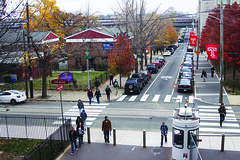In an effort to help resolve the long-time rift between Main Campus students and area residents, Temple Student Government and administrators are presenting new policies and encouraging stricter enforcement of the student code of conduct.
While the code of conduct subjects students to disciplinary sanctions for unlawful use and distribution of alcohol, Associate Vice President for Student Affairs and Dean of Students Stephanie Ives said a “Good Neighbor” policy will be enacted soon.
“This policy is going to encourage students to promote civic engagements in the neighborhoods, focusing on reducing alcohol consumption, addressing conduct, keeping down the noise, removing trash and just being respectful to your neighbors in general,” Ives said.

On Nov. 5, President Ann Weaver Hart sent a mass e-mail addressing off-campus behavior and, more specifically, reports of large, rowdy off-campus parties students pay to enter.
Hart said as many as 7,000 studentsnow live off campus, and community members said they have felt the impact.
“I hear parties at 2 a.m. on a Wednesday night and end up having to call the cops,” said Margaret Davis, 37, of Willington Street.
“These kids need to learn to respect their neighbors, at least on the weekdays,” Davis said. “Temple Police should be more aware about this kind of stuff and crack down on these parties. It’s not fair to the neighbors.”
TSG Senate President Colin Saltry said TSG has been working on the “Good Neighbor” policy for the past four years, on and off.
According to its policies and procedures manual, the policy aims to “establish basic guidelines for Temple students to be good neighbors and to conduct themselves as responsible members of the Temple community.”
“I have a few Temple kids who are good friends of mine. Some people don’t really know how to approach these kids or talk to them,” Jehovan Myers, 59, said. “It’s not just the kids – the community needs to realize when they choose to live here that there’s students here. They should take advantage of that.”
Ives said the student code of conduct applies to all Temple students, whether they live on or off campus.
“The bottom line is to think of the communities surrounding Temple like they were your homes and to respect the community as neighbors,” Ives said.
The Oct. 31 incident in which Ian Hirst-Hermans, a junior advertising major, was shot in the chest spurred discussion about negative consequences of parties and their impact on community relations, Saltry said.
“If you could stop parties from happening, you wouldn’t have people urinating on people’s gardens, destroying property and throwing garbage everywhere at 4 in the morning,” Saltry said.
Hart’s e-mail addressed that “large, uncontrolled off-campus house parties” are against the law, but Saltry said students are well aware that providing alcohol to minors is illegal.
“Of course they know,” Saltry said. “These people have nowhere else to turn to for alcohol, so they’re exploiting an untapped market.”
Saltry said TSG is working on several other initiatives to better community relationships and increase safety on campus.
Saltry suggested a party registration system. While fraternities and sororities must currently report their social events, Saltry said the registration system would require all house parties to report their events to “mitigate the effects of parties.”
Another idea, Saltry said, is to create a volunteer corps for students to pick up the waste that house parties generate in nearby neighborhoods.
However, Saltry said the “urgency” with which the adminstration is pursuing the problem could make matters worse.
“That type of a quick-swift response in terms of enforcement could have the unintended consequence of driving these things further underground and pushing students farther off into the neighborhood to party,” Saltry said.
Dior Billups, a junior public health major, said she thinks increased enforcement will not help curb the number of parties.
“Even if they [the adminstrators] fine people, I think they’re still going to [have parties] anyway,” Billups said.
Part of the problem, Billups said, is that some students moved into the surrounding neighborhoods and moved people out with no regard for their feelings or attachment to the communities.
Saltry said students are more like “transients” and exhibit a lack of respect for the surrounding neighborhoods and their long-time residents.
“You have people that come here for four years, and [in] most instances, [students] get a one-year lease,” Saltry said. “You’re in that house for a year on a block with people who have been there for 50 years or more and are invested in their neighborhood.”
“People don’t care,” Billups said. “Even if they were disturbing other college students, they still wouldn’t care.”
Cary Carr and Alyssa Saylor can be reached at news@temple-news.com.



Who cares???? Clean up the area and push the locals out!
I had no idea PHA residents are considered a “community.” If they don’t own property, they shouldn’t be considered part of the community.